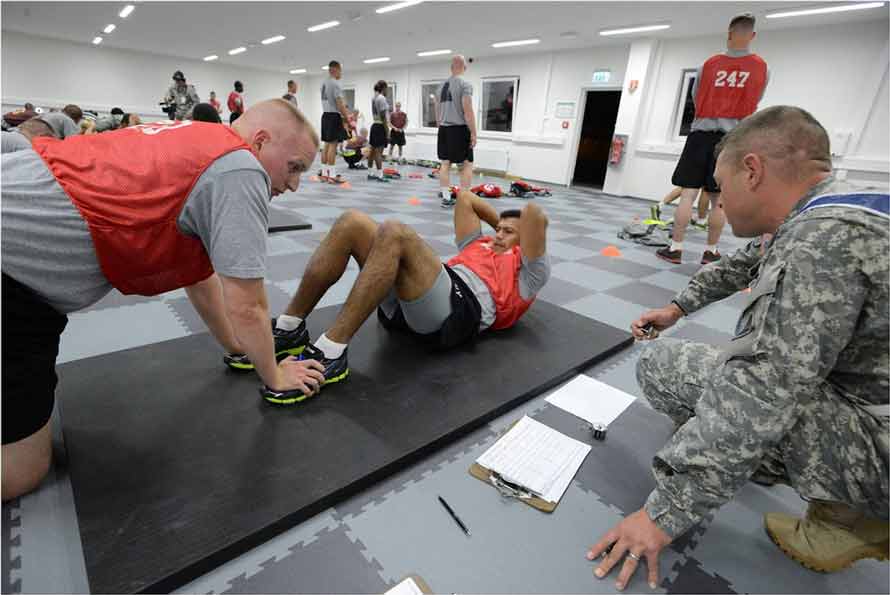UPDATE: FORT GEORGE G. MEADE, Maryland — The Marine Corps has announced today that revisions have been made to its physical fitness program, to include the Physical Fitness Test (PFT), Combat Fitness Test (CFT) and the Body Composition Program (BCP). Changes to BCP will take effect immediately, while PFT and CFT changes will be implemented starting Jan. 1, 2017. This includes a study on military sit ups.
The PFT changes are among the most profound since 1972 and the changes to the CFT standards are the first since its inception in 2009.
“Last November we began a comprehensive review of physical fitness and body composition standards,” said Gen. Robert B. Neller, the 37th Commandant of the Marine Corps. “Subsequent efforts focused on developing a physical fitness program that incentivizes behavior toward an end state of a healthy and fit force able to better answer the call in any clime and place.”
Excerpted from The Official Website of the United States Marine Corps, July 1, 2016. Article by Sgt. Cuong Le, Defense Media Activity. Click here for the full article.
ORIGINAL ARTICLE:
The U.S. Army has started phasing out sit-ups for some soldiers, and the Navy and Marine Corps are considering new fitness requirements. Personal trainers and military advisers now believe that sit-ups are dangerous, because they put too much pressure on the spine. They say men and women should replace them with the plank pose, which is when you stay in the upward part of a push-up.
An editorial in Navy Times, which covers the US Navy, recently called for sit-ups to be banned completely. It called them an ‘outdated exercise today viewed as a key cause of lower back injuries’. The Navy is said to be currently reviewing it fitness requirements. The US Marine Corps is also reviewing its physical fitness and body composition standards – in an attempt to improve fitness and reduce injuries.
The US Army has already put 10,000 soldiers through a pilot of a revamped physical-fitness test that excluded sit-ups. One study found that 56% of all soldiers’ injuries related to the old test were because of sit-ups.
Commanders are conducting the review and will present their findings by July 2016. General Robert Neller, Commandant of the Marine Corps., said: ‘At the end of the review, the end state is for a Marine Corps Physical Fitness Program that ensures the overall health and fitness of our Corps.’
The Canadian Armed Forces have already done this, and phased out sit-ups; soldiers now lift 44-pound sandbags instead. Stuart McGill, a professor of spine bio-mechanics at the University of Waterloo in Canada said that dozens of studies showed that sit-ups can squeeze the discs in the spine. Over time they can bulge which presses on nerves, causes pain and can lead to a herniated disc.
Pete McCall, spokesman for the American Council on Exercise, told the Wall St Journal that sit-ups are ‘an antiquity of exercise best left in the dustbin of fitness history’.
Tony Horton, creator of the popular P90X video workout series said he had banned sit-ups and crunches too.
He said: ‘I really believe that the traditional, antiquated crunch has seen better days, and it’s time to make a change’.
Many exercise trends that start in the US make their way to the UK, meaning that British experts may begin to phase out military sit ups too.
According to the National Institute of Neurological Disorders and Stroke, approximately 80 percent of US adults experience lower back pain at some point in their lives.
A recent survey showed that more than a quarter of adults experienced low back pain sometime in the last three months.
Low back pain has become more common than ever, the NINDS reported.
In 1990, a study ranked it as the sixth most burdensome condition in the US.
Read more: http://www.dailymail.co.uk/health/article-3370950/Are-sit-ups-BAD-Exercise-outdated-key-cause-lower-injury-replaced-plank.html#ixzz4BaHvGhpIFollow us: @MailOnline on Twitter | DailyMail on FacebookExcerpted from The Daily Mail, December 22, 2015. Article by Daniel Bates. Click here for the full article.

